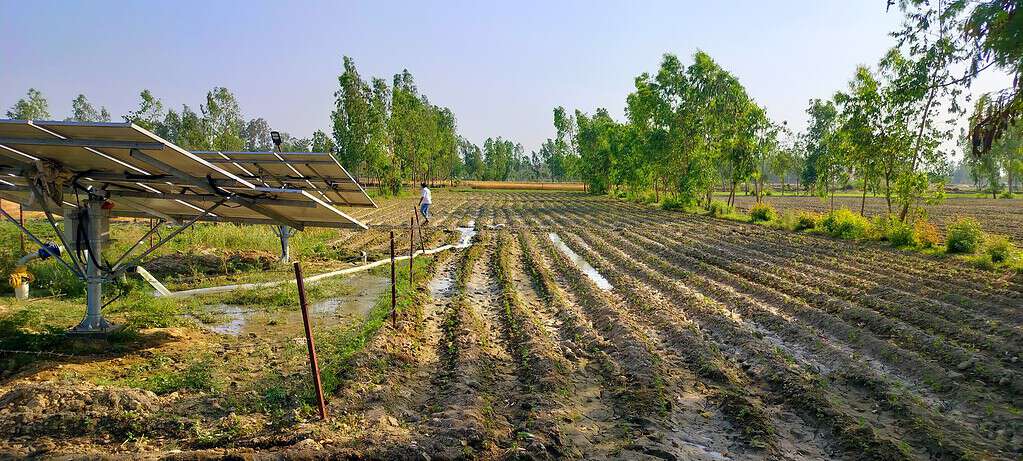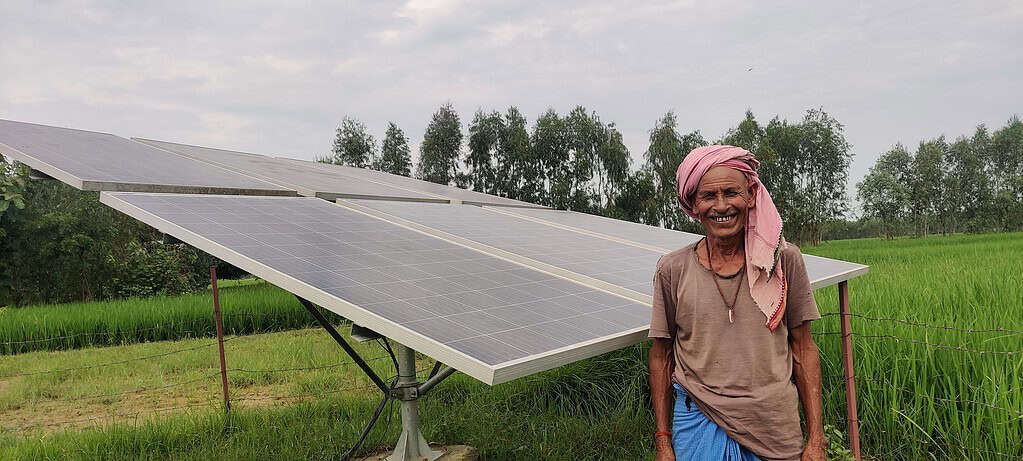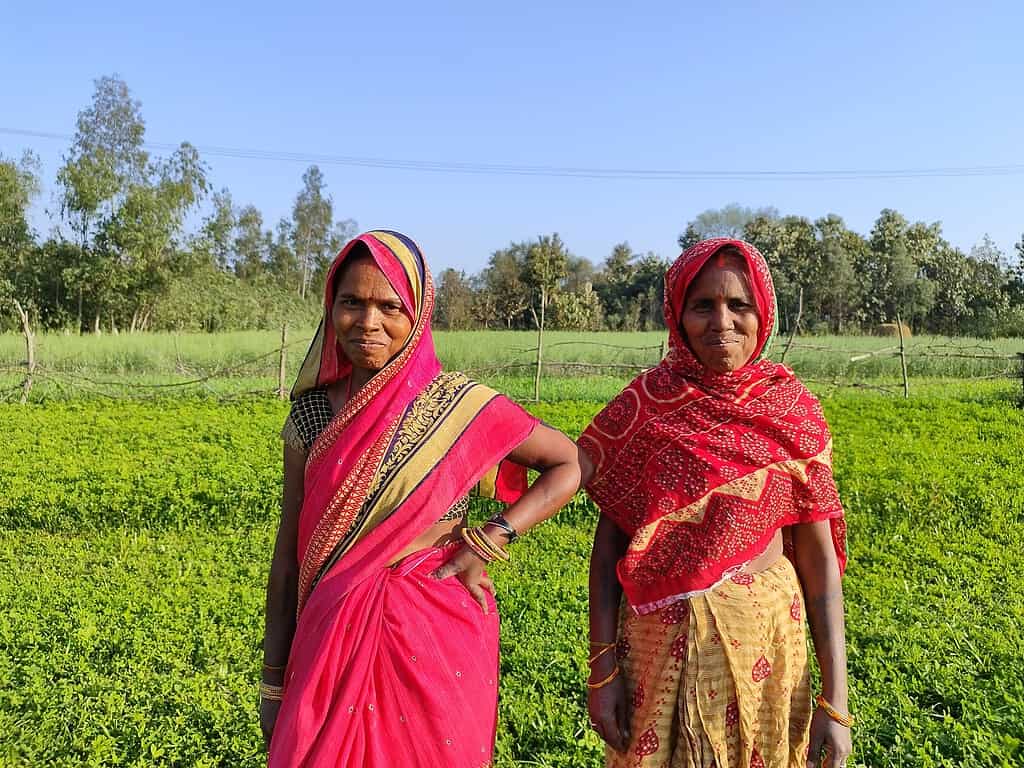Oorja is scaling a decades-old technology for the first time in India

Oorja, a new Acumen investee that is modernizing the agricultural landscape in India through its farming-as-a-service model.
- Blog
- Energy
- India
Maize – onion – garlic – peppermint – pumpkin – potato. These are some of the crops opening up new economic opportunities for smallholder farmers across India. In the rural heartlands, farmers face numerous challenges in their daily battle to sustain their livelihoods and adapt to a rapidly changing climate. Traditionally, many have relied on polluting and costly diesel-powered pumps for irrigation, which not only contribute to environmental degradation but also strain their limited financial resources. But with access to clean, reliable, and affordable irrigation, farmers can move beyond traditional staples and explore new, more lucrative options, ensuring higher yields and income.
The company behind this shift is Oorja, a new Acumen investee that is modernizing the agricultural landscape in India through its farming-as-a-service model. The core of Oorja’s approach is to provide smallholder farmers with access to shared solar-powered irrigation systems without the need for any upfront costs.
“Oorja helps smallholders farm profitably and sustainably,” says Clementine Chambon, co-founder of the company. “We primarily focus on marginal farmers in India and help them switch away from fossil fuels so that they can grow crops year-round. And better support their families.”
Solar-powered pumps
The company launched in 2016 after two founders with radically different backgrounds (Chambon in chemical engineering and her co-founder Amit Saraogi in investment banking) identified a common goal to serve the needs of Indian farmers. “We wanted to develop our own technology to convert agricultural waste into fuel or power, but realized that actually, our ambitions were more social than that.” They landed on utilizing existing technology – solar irrigation pumps – and opted to innovate around the distribution challenge, “because it was greater than the technology challenge.” And it could also scale much faster.

Solar irrigation pumps have existed since the late 1970s but never reached critical mass due to high upfront costs, lack of consumer finance, and low awareness. In India, that all began to change when the government introduced the PM-KUSUM capital subsidy scheme in 2019 that aimed to ensure energy security for farmers in India, along with honoring India’s commitment to increase the share of installed capacity of electric power from non-fossil-fuel sources to 40% by 2030.
Oorja rode the wave, but took their own path. Instead of asking farmers to invest in costly individual systems, they install and maintain shared solar-powered pumps in the northern states of India for use among groups of 15 farmers. Farmers never need to buy a pump; they pay per use. “The tech had existed for quite some time but they turned a private asset into a community asset,” says Priyanka Dudeja, Acumen India’s portfolio associate who led the investment. “It has been difficult for companies to offer farming-as-a-service profitably. Because Oorja is an impact-focused company, they have stepped into the space and are working to make it financially sustainable, which we want to help with. Once we’ve proved financial sustainability alongside impact, then we believe others will step into the space.”
Minimizing behavioral change
A crucial aspect of the company’s early growth – their pumps have reached around 25,000 farmers in Uttar Pradesh and Bihar – is their emphasis on minimizing behavior change for farmers. Oorja ensures that the cash payments farmers make for solar irrigation services are less costly and the same regularity as the payments they historically made for irrigation from diesel pumps. They also ensure there is no upfront cost barrier and hire familiar faces (i.e local farmers) to manage the daily operations of the pumps.
According to a study conducted by 60 Decibels, a mighty 94% of farmers reported an increase in their income and an improvement in their quality of life since adopting Oorja’s services. This impact is so substantial that Oorja recently won 60 Decibels’ Top Energy Impact Awards for 2024. “Oorja Solutions’ water pump saves money and time,” says one farmer. “My crop production has increased. I grow 1–2 quintals more than I used to, all because of the solar pump.”
“The crop yield has increased in the fields, and I have also expanded the cropping area,” says another farmer. “Earlier, crops used to dry up because the [diesel] engine couldn’t lift enough water. [Now], due to sufficient availability of water because of the solar water pump, whatever I sow is reaped.”

Speeding up the switch
The model holds significant implications for India’s agricultural sector and its efforts to combat climate change. “This is a way to really accelerate the energy transition because so much of the Indian population is involved in farming and uses irrigation on a daily basis,” says Chambon. While undoubtedly a net positive for emissions, concerns about groundwater depletion associated with a proliferation of water pumps in India are duly noted by the team. Oorja has so far found no evidence of depletion in the project areas where solar pumps are installed, and they plan to continue investigating and take precautionary measures, such as introducing new crops that require less water, if a significant dip in water level is observed.
By demonstrating the viability and scalability of a service-based model, Oorja is driving a paradigm shift in how renewable energy technologies are disseminated and adopted, particularly within the agricultural sector. Partnerships with larger organizations like the German Development Agency and HCL Foundation will introduce their model in new districts of the country, helping them to become one of the largest agricultural service providers, and demonstrating that their model can both make economic sense, while positively impacting farmer welfare and the natural world.